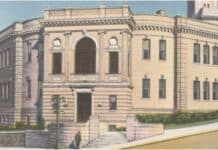
By Mary Hoar–President Emerita, Yonkers Historical Society
Monday, Aug. 26
Aug. 26, 1942: Although our city fathers stated many times that “gambling does not exist here,” a number of young men – employees of a nearby elevator plant, held a “craps game” in Larkin Plaza, right across the street from the police garage. The games attracted quite a crowd of young ladies rooting for their favorite player… and still no police appeared. More and more people joined the spectators cheering on the game… and still no police.
The game finally broke up when the Otis factory whistle – calling its employees back to work after their lunch hour – tooted and broke up the game!
Aug. 26, 1944: Habirshaw Cable and Wire Corporation began a campaign to remind workers not to lose their Social Security card. They printed this message “… replacing 1,861,871 lost cards last year cost Uncle Sam the price of 550 jeeps” on the back of every paycheck – a good reminder to hold onto those cards.
Tuesday, Aug. 27
Aug. 27, 1943: A well-known Yonkers drummer began using his talents while in the service. While stationed in the Canal Zone, Cpl. Alfred DeFemio joined a jazz quintet and played in the Cristobal USO club every Thursday night in the lobby from 7:30 to 9 p.m. Four of the five musicians were from Westchester.
Aug. 27, 1943: City Clerk Francis Heafy announced that the State War Ballot Commission refused to send proportional representation ballots to our men and women serving overseas. Because of the refusal, the local ballots could be counted as soon as the election ended.
Aug. 27, 1964: The Rev. Dr. Martin Luther King Jr. made a quiet visit to the Sprain Brook Library on Central Park Avenue to watch the special registration campaign being conducted there. He met each one of the registrars and personally thanked them for the outstanding service they were performing.
Wednesday, Aug. 28
Aug. 28, 1934: Republican members of the Common Council criticized Mayor Loehr’s plan to borrow $3 million to put Yonkers back on track; their major objection was the 5 ½ percent interest to be paid.
Aug. 28, 1936: The Yonkers SPCA created drinking stations for dogs throughout Yonkers. It was thought the dogs would be less likely to bite if they had access to water.
Aug. 28, 1945: Yonkers learned it had a 100 percent war veteran family, the Thomas Cooney family. Father Thomas served in World War I and was in Battery B, 58th CAC of the AEF. Mom Gertrude Cooney, also a WW I vet, was a Navy Yeoman, precursor of the waves. Their older son, Thomas Jr., served as a Naval lieutenant in the Pacific, while their younger son, Jon, was a third-class hospital corpsman at a Navy hospital in Florida.
Thursday, Aug. 29
Aug. 29, 1935: Captain Dennis Cooper and acting Captain John Ryer commanded a corps of Yonkers Police Department guards for the Hip Sing Tong headquarters at 8 Herriot St. A war had broken out between the Hip Sings and the On Leongs in New York City, and the local police force wanted to prevent any spillover of the conflict in Yonkers.
Aug. 29, 1951: Yonkers prizefighter Roger Donoghue fought his first bout in Madison Square Garden. He was slated to fight George Flores, but Donoghue did not want to fight a man he had already knocked out. He again knocked out Flores, but this time the injured man did not regain consciousness. Diagnosed with a severe concussion and a possible fractured skull, Flores died two weeks later.
After giving his prize money to the Flores family, Donoghue withdrew from boxing. The Yonkers man went on to a career as a Hollywood consultant, teaching Marlin Brando how to fight for his role in “On the Waterfront,” and training James Dean on the set of “Rebel Without a Cause.
Friday, Aug. 30
Aug. 30, 1937: Yonkers License Clerk William Corbalis reported that couples were rushing to the City Clerk’s Office. The twosomes were trying to beat the deadline before New York’s new law went into effect in two days; the new regulation required a three-day wait to get married after obtaining a marriage license.
Aug. 30, 1945: Yonkers people began noticing signs that the war was over. Groups of unemployed men again began standing in Getty Square, just as they did in the prewar days. Cigarettes were displayed on racks behind the counter, just as they did in the prewar days. Shop owners had hidden more popular brands for their favorite customers. And most telling, car owners pulled into gas stations and told the attendants, “Fill it up,” just as they did in the prewar days.
Saturday, Aug. 31
Aug. 31, 1945: A woman went to the chambers of Yonkers City Judge Charles Boote, asking for help to get her son get a job in the Federal Bureau of Investigations; the young man dreamed of being an agent. The good judge was always happy to write references for people he knew, but he did not recognize the boy’s name and asked the mother how he knew her son.
Her answer? “He appeared before you on several charges.”
Boote did not write the reference letter to the FBI.
Aug. 31, 1953: H. W. Wilson Company Reference Shelf Series released “Presidential Election Reforms,” a book edited by Walter Daniels of Greystone Place. Daniels was assistant to the foreign news editor of the New York Times. The book contained articles written by several notables such as James Farley, Estes Kefauver and George Gallup, and discussed the anachronisms of our election system.
One of the topics raised was the Electoral College, and that Nevada citizens had one electoral vote for every 33,000 citizens, while 250,000 New Yorkers shared one electoral vote.
Sunday, Sept. 1
Sept. 1, 1919: The first incident in the Waring Hat Factory strike occurred; a striking driver punched a coworker who crossed the picket line with 11 other former strikers.
Sept. 1, 1944: Mayor Curtiss Frank appointed a committee to work on an engineering project to run Putnam Division trains directly to Grand Central Terminal. Frank stated that not only would this benefit Yonkers, but also all of Westchester County serviced by the Putnam. Although used by many Saw Mill River Valley residents, time was lost each day because people had to transfer at High Bridge to trains that went to the terminal.
For more information on the Yonkers Historical Society, Sherwood House and upcoming events, visit www.facebook.com/YonkersHistoricalSociety or LinkedIn and Twitter @YonkersHistoric. For information on membership in YHS, call 914-961-8940 or email yhsociety@aol.com.





